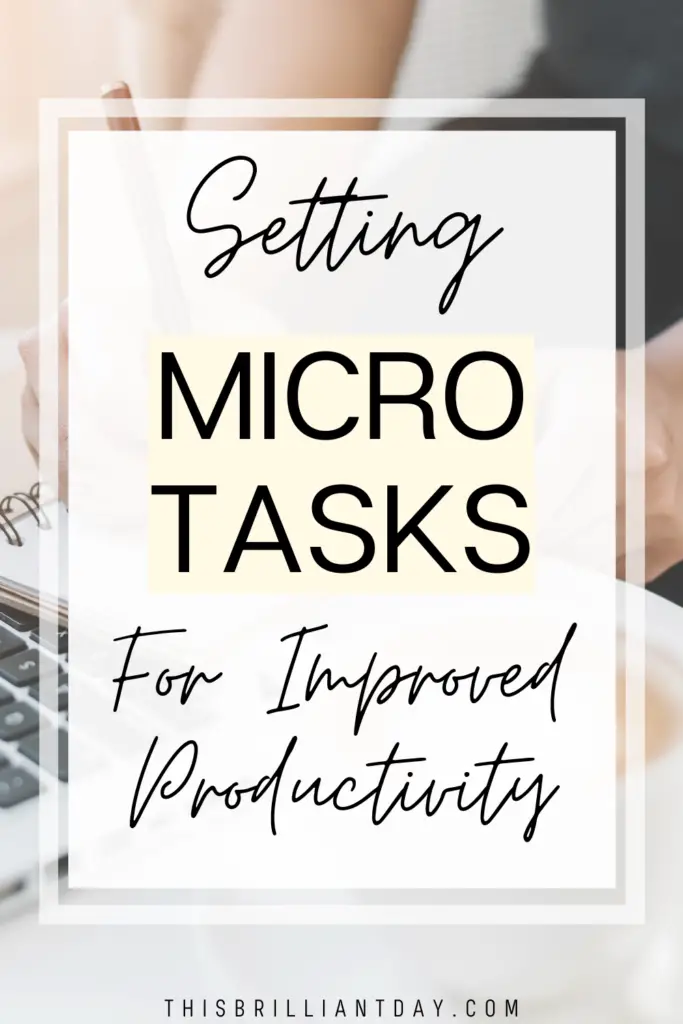Each morning (or sometimes the evening before), I write up a to-do list for the day. I list all the tasks I would like to achieve, in roughly the order of priority.
Lately, some common items I have added to my to do list include, ‘blog promotion’, ‘blog improvements’ and ‘tidy’. What is the problem with these tasks? They are too vague! How much blog promotion do I need to do, in order to tick that task off my list? Which improvements do I need to make to my blog today? How long do I need to spend tidying?
It’s not that I am completely stumped. For example, I have a long list of ways to promote my blog, and improvements to make to it. But of course I would never complete all those things in a whole day, let alone in one session. It can feel daunting, seeing an item like ‘blog improvement’ on my to-do list, and looking at a long list of blog improvements that need doing. I don’t know where to start, so it’s hard to get started at all!
Even when I do get started on an ‘umbrella’ task like that, I tend to get easily distracted and start procrastinating. This is because it’s unclear what I am actually aiming to achieve on that day.
So how can I solve this problem?
Essentially, every task on my to-do list is a goal, and the key to a well-written goal is to make it specific, and measurable! My examples above are not specific or measurable. When I write my to-do list, I don’t necessarily know what exact aspect of a task I will want to work on, or exactly how I will carry out that task. I don’t want to make a detailed plan at the time of writing my to-do list, because I never know how the day will turn out. I don’t know how much time I will end up dedicating to that task, and what I will feel like doing at the time. That’s okay, I don’t actually have to change anything at the planning stage. But the difference is what happens when I come to work on a task.
Instead of working on a task at random, for an undetermined amount of time, I could choose and write down a set of 2 or 3 micro tasks related to the overall task. The micro tasks should be specific, measurable tasks that won’t take long to do. I don’t need to do this until I am just about to work on the overall task. This way, I can choose micro tasks based on what I feel like at the time.
Here are some examples of micro tasks
For the ‘umbrella’ task, ’blog promotion’:
- post / schedule X number of Tweets
- write a specific Tweet promoting a blog post
- post on X follow trains and interact with X bloggers
- comment on X blogs
For ‘tidy’:
- clear out the top drawer of my desk
- put all my clothes away in the wardrobe
- empty my bin and recycling
The number of micro tasks I set myself will depend on how much time I have available. If I don’t have long, I could just set 1 micro task. If I get it done quickly, I can always add another task. On the other hand, if my micro tasks take longer than expected, I can save them for later, or carry them over to the next day. In general, it’s better to start with a low number of tasks so that it feels less overwhelming and more achievable.
As an alternative, I could set a timer for however long I want to work on the umbrella task (for example, 30 minutes) and just work on it for that amount of time, with no expectations of how much I will get done.
When I have completed my micro tasks (or the timer runs out), I can choose to either tick that umbrella task off for the day, or add more micro tasks if I feel I want to work on it more.
I have been keeping a list of possible micro tasks for various of my common ‘umbrella tasks’. When it’s time to work on a task, I can just consult my list and pick a few from there. This makes the process quick and easy.
Do micro tasks improve my productivity?
I have been trying out this method over the past couple of weeks, and it has really made a difference to my productivity! Breaking down large tasks into bite-size chunks and tackling them just a few at a time helps me to get more done in the long run, and lessens the chance of procrastination. So next time you are feeling overwhelmed by a task that seems too big and vague, I would definitely recommend setting some micro tasks!




I really enjoyed the encouragement and REMINDERS you gave in this post !! For me personally, it reminded me to focus on the daily goals even if they’re small! Smalls ones eventually lead to bigger ones! Thanks so much for sharing 💕 I’m glad to have you in my blogging community! You always share really helpful info!
I’m so glad you enjoyed this post! Absolutely, small goals all add up, and lead to bigger ones! I’m so glad to have you on board too, and I love all your posts!